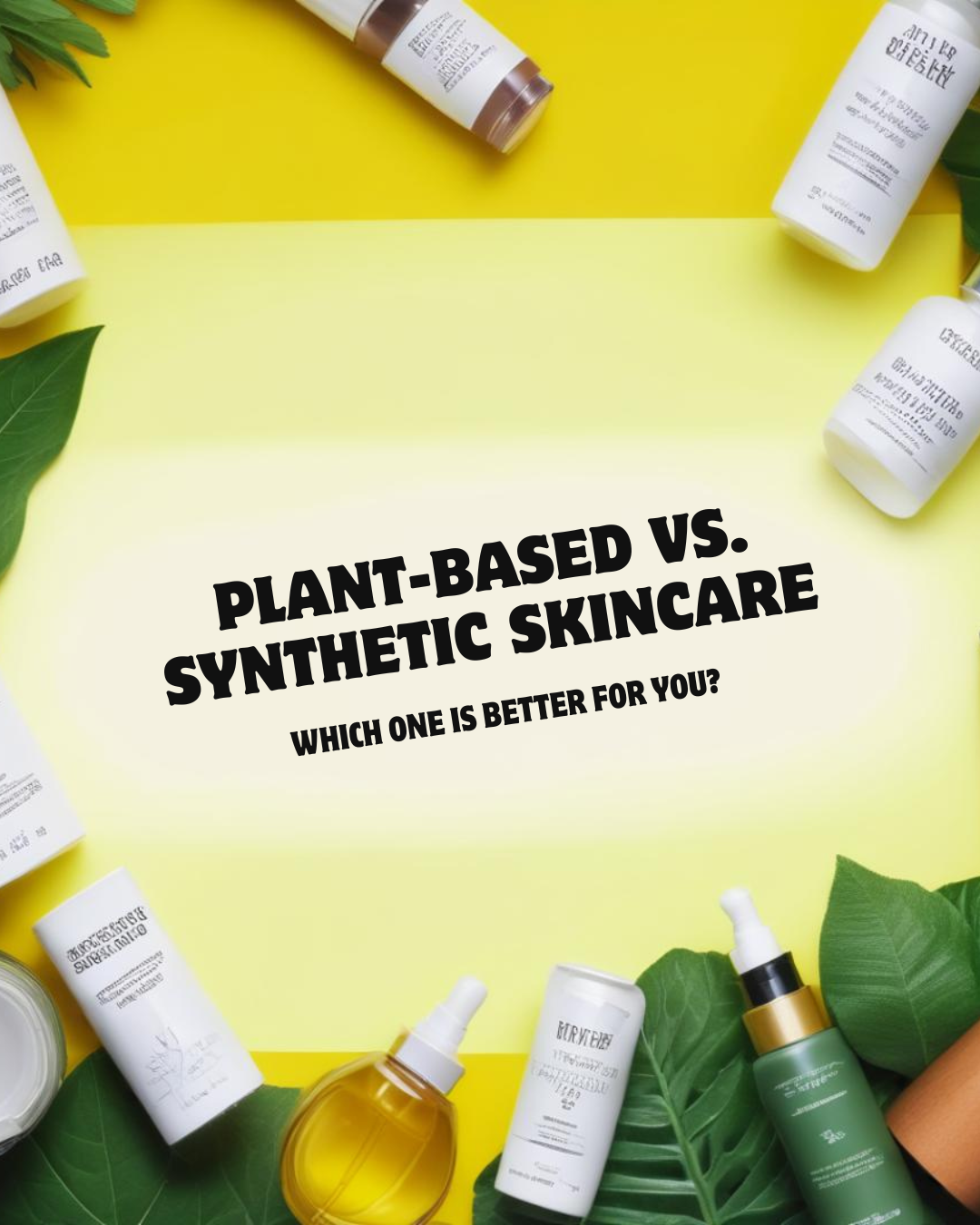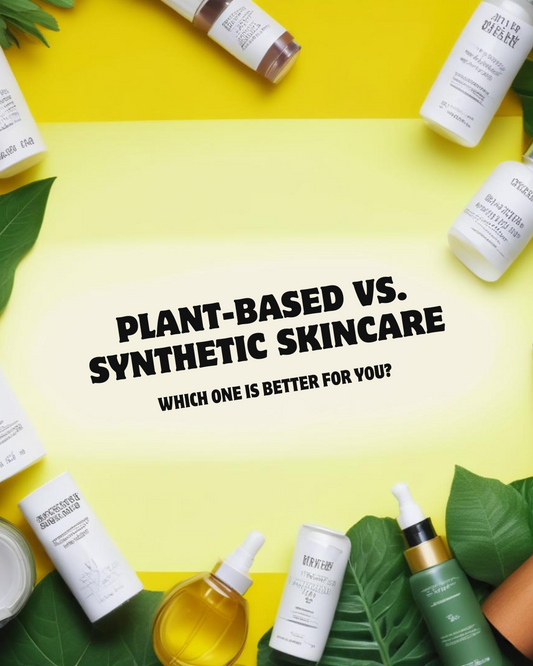🌱 Plant-based skincare has gained popularity as more people seek clean, natural, and chemical-free beauty products. But how does it compare to synthetic skincare in terms of effectiveness? Are natural ingredients truly better for your skin, or do synthetic formulations offer superior results?
This guide will break down the pros and cons of plant-based and synthetic skincare, helping you choose the best option for your skin type and concerns.
🌿 What is Plant-Based Skincare?
Plant-based skincare uses botanical extracts, oils, butters, and naturally derived ingredients to nourish and protect the skin. These products avoid harsh chemicals, synthetic fragrances, and artificial preservatives, making them ideal for sensitive, dry, and eczema-prone skin.
✔ Common Plant-Based Ingredients & Benefits:
- Shea Butter – Deeply hydrates dry skin and repairs the skin barrier.
- Aloe Vera – Soothes irritation, redness, and inflammation.
- Rosehip Oil – Rich in vitamin C and antioxidants to brighten and repair skin.
- Jojoba Oil – Mimics natural sebum, providing balanced moisture.
- Green Tea Extract – Fights free radicals and reduces signs of aging.
✅ Pros:
✔ Gentle and non-toxic
✔ Rich in vitamins, antioxidants, and essential fatty acids
✔ Biodegradable and eco-friendly
✔ Works with the skin’s natural processes
❌ Cons:
🚫 Shorter shelf life due to lack of synthetic preservatives
🚫 May take longer to show results compared to synthetic alternatives
🧪 What is Synthetic Skincare?
Synthetic skincare products are formulated in labs using man-made ingredients such as silicones, parabens, sulfates, and artificial fragrances. These products often promise fast results, such as instant hydration, anti-aging effects, or acne reduction.
✔ Common Synthetic Ingredients & Benefits:
- Retinol – Boosts collagen production and reduces fine lines.
- Silicones (Dimethicone) – Creates a smooth, silky texture but can clog pores.
- Parabens – Preservatives that prevent bacterial growth (but can disrupt hormones).
✅ Pros:
✔ Fast-acting and targeted treatments
✔ Longer shelf life
✔ Stable formulations with controlled potency
❌ Cons:
🚫 May contain harsh chemicals that irritate sensitive skin
🚫 Potentially toxic ingredients (parabens, sulfates, synthetic fragrances)
🚫 Can cause long-term damage by disrupting the skin barrier
🔬 Plant-Based vs. Synthetic: Which is More Effective?
1️⃣ Hydration & Moisturization
🌱 Plant-Based Winner: Shea Butter & Natural Oils
Plant-based butters (shea, cocoa, mango) and oils (jojoba, coconut, rosehip) lock in moisture naturally and nourish the skin without clogging pores.
🧪 Synthetic Alternative: Silicones & Petrolatum
Silicones create a temporary smooth effect but don’t truly hydrate skin. Petrolatum locks in moisture but is derived from petroleum, which can suffocate the skin.
💡 Verdict: Plant-based moisturizers offer deeper, long-term hydration without synthetic fillers.
2️⃣ Anti-Aging & Collagen Boosting
🌱 Plant-Based Winner: Bakuchiol & Antioxidants
Bakuchiol (a natural alternative to retinol) helps boost collagen production without irritation. Rosehip oil & green tea provide antioxidants that fight free radicals and prevent premature aging.
🧪 Synthetic Alternative: Retinol & Peptides
Retinol (vitamin A) is one of the most powerful anti-aging ingredients but can cause redness, peeling, and sun sensitivity. Peptides help with collagen synthesis, but some are lab-made and not always derived from natural sources.
💡 Verdict: For sensitive skin, plant-based options like bakuchiol are safer. But if you want fast, dramatic anti-aging results, retinol is more potent.
3️⃣ Acne Treatment & Oil Control
🌱 Plant-Based Winner: Tea Tree Oil & Witch Hazel
Tea tree oil has antibacterial properties that fight acne without over-drying the skin. Witch hazel is a natural astringent that reduces oil production and calms inflammation.
🧪 Synthetic Alternative: Benzoyl Peroxide & Salicylic Acid
Benzoyl peroxide kills acne bacteria quickly but can cause dryness and irritation. Salicylic acid is effective for unclogging pores but may strip the skin barrier if overused.
💡 Verdict: For mild to moderate acne, plant-based treatments are gentler. For severe acne, synthetic treatments work faster but may cause irritation.
4️⃣ Sensitivity & Eczema Care
🌱 Plant-Based Winner: Oat Extract, Chamomile, & Shea Butter
Oat extract and chamomile are known for soothing inflammation, reducing redness, and calming sensitive skin. Shea butter deeply hydrates without irritating eczema-prone skin.
🧪 Synthetic Alternative: Steroid Creams & Hydrocortisone
Synthetic eczema treatments like hydrocortisone offer fast relief but can thin the skin with prolonged use.
💡 Verdict: For long-term sensitive skin care, plant-based solutions are safer and more sustainable.
🌏 Environmental & Ethical Considerations
🌱 Plant-Based Skincare:
✔ Eco-friendly & biodegradable
✔ Cruelty-free & sustainable
✔ Less water waste in production
🧪 Synthetic Skincare:
❌ Can contribute to pollution (plastic packaging, microplastics, chemical runoff)
❌ Some synthetic ingredients harm marine life
💡 Verdict: Plant-based skincare is the clear winner for sustainability and ethical sourcing.
📌 Final Verdict: Which Should You Choose?
| Factor | Plant-Based Skincare | Synthetic Skincare |
|---|---|---|
| Hydration | ✅ Deep, long-lasting moisture | ❌ Temporary hydration with silicones |
| Anti-Aging | ✅ Gentler (Bakuchiol, Antioxidants) | ✅ Fast-acting (Retinol, Peptides) |
| Acne Treatment | ✅ Mild & natural (Tea Tree, Witch Hazel) | ✅ Strong but harsh (Benzoyl Peroxide, Salicylic Acid) |
| Eczema Care | ✅ Soothing & natural (Oat, Chamomile, Shea) | ❌ Steroids work fast but have risks |
| Environmental Impact | ✅ Eco-friendly & sustainable | ❌ Often wasteful & polluting |
💡 Overall, plant-based skincare is the best option for sensitive, dry, and long-term skin health, while synthetic products may provide quicker results but often come with harsh side effects.
🛍️ How to Choose the Right Skincare for You
✔ If you have sensitive skin, eczema, or prefer clean beauty, choose plant-based skincare.
✔ If you want fast, visible results (anti-aging, acne treatment), you might benefit from a mix of plant-based and synthetic ingredients.
✔ Always check ingredient lists and avoid harsh chemicals like parabens, sulfates, and silicones.
🔎 Final Thoughts: Plant-Based vs. Synthetic Skincare
Both plant-based and synthetic skincare have their strengths, but for long-term health, sustainability, and skin nourishment, plant-based skincare is the superior choice.
Would you like help choosing the best natural skincare products? Comment below! 💬




